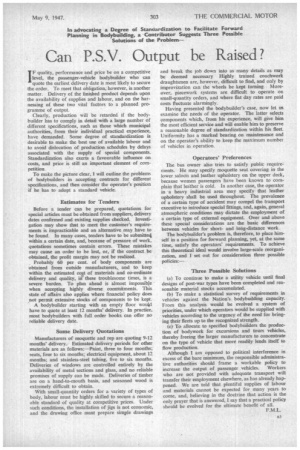In advocating a Degree of Stanoardization to Facilitate Forward Planning
Page 37

If you've noticed an error in this article please click here to report it so we can fix it.
in Bodybuilding, a Contributor Suggests Three Possible Solutions of the Problem—
Can P.S.V. Output be Raised?
IF quality, performance and price be on a competitive level, the passenger-vehicle bodybuilder who can quote the earliest delivery date is most likely to secure the order. To meet that obligation, however, is another matter. Delivery of the finished product depends upon the availability of supplies and labour, and on the harnessing of these two vital factors to a planned programme of output.
Clearly, production will be retarded if the bodybuilder has to comply in detail with a large number of different specifications, such as those which municipal authorities, from their individual practical experience, have demanded. Some degree of standardization is desirable to make the best use of available labour and to avoid dislocation of production schedules by delays associated with the supply of special components. Standardization also exerts a favourable influence on costs, and price is still an important element of competition.
To make the picture clear. I will outline the problems of bodybuilders in accepting contracts for different specifications, and then consider the operator's position if he has to adopt a standard vehicle.
Estimates for Tenders
Before a tender can be prepared, quotations for special articles must be obtained from suppliers, delivery dates confirmed and existing supplies checked. Investigation may show that to meet the customer's requirements is impracticable and an alternative may have to be found. In many cases, tenders have to be submitte4 within a certain date, and, because of pressure of work, quotations sometimes contain errors. These mistakes may cause an order to be lost, or, if the contract be obtained, the profit margin may not be realized.
.Probably 60 per cent. of body components are obtained from outside manufacturers, and to keep within the estimated cost of materials and co-ordinate delivery and quality, in these troublesome times, is a severe burden. To plan ahead is almost impossible • when accepting highly diverse commitments. This state of affairs also applies where financial policy does not permit extensive stocks of components to be kept.
A bodybuilder starting with an empty floor would have to quote at least 12 months' delivery. In practice, most bodybuilders with full order books can offer no reliable delivery date.
Some Delivery Quotations
Manufacturers of moquette and rep are quoting 9-12 months' delivery. Estimated delivery periods for other materials are as follows:—Paint, three to four months: seats, four to six months; electrical equipment, about 12 months: and stainless-steel tubing, five to six months. Deliveries of windows are controlled entirely by the availability of metal sections and glass, and no reliable promises of supply can be made. Deliveries of timber are on a hand-to-mouth basis, and seasoned wood is extremely difficult to obtain.
With small-quantity orders for a variety of types of body, labour must be highly skilled to secure a reasonable standard of quality at competitive prices. Under such conditions, the installation of jigs is not economic, and the drawing office must prepare simple drawings and break the job down into as many details as may be deemed necessary Highly trained coachwork draughtsmen are, however, difficult to find, and only by improvization can the wheels be kept turning Moreover, piecework systems are difficult to operate on small-quantity orders, and where flat day rates are paid costs fluctuate alarmingly.
Having presented the bodybuilder's case, now tel us examine the needs of the operator. The latter selects components which, from his experience, will give him the most efficient service and will enable him to preserve a reasonable degree of standardization within his fleet. Uniformity has a marked bearing on maintenance and on the operator's ability to keep the maximum number of vehicles in operation.
Operators' Preferences The bus owner also tries to satisfy public requirements. He may specify moquette seat covering in the lower saloon and leather upholstery on the upper deck, because women passengers have been known to complain that leather is cold. In another case, the operator in a heavy industrial area may specify that leather upholstery shall be used throughout. The prevalence of a certain type of accident may compel the transport executive to introduce special fittings, and, again, general atmospheric conditions may dictate the employment of a certain type of external equipment. Over and above these special considerations are the basic differences between vehicles for shortand long-distance work.
The bodybuilder's problem is, therefore, to place himself in a position for forward planning, yet, at the same time, satisfy the operators' requirements. To achieve this theoretical ideal would involve large-scale reorganization, and I set out for consideration three possible policies:—
Three Possible Solutions
(a) To continue to make a utility vehicle until final designs of post-war types have been completed and reasonable material stocks accumulated.
(b) To make a statistical survey of requirements in vehicles against the Nation's bodybuilding capacity. From this analysis would be evolved a system of priorities, under which operators would be supplied with vehicles according to the urgency of the need for bringing their fleets up to the recognized strength.
(c) To allocate to specified bodybuilders the production of bodywork for excursions and tours vehicles, thereby freeing the larger manufacturers to concentrate on the type of vehicle that more readily lends itself to flow production.
Although I am opposed to political interference in excess of the bare minimum, the responsible administrative authorities should frame a workable policy to increase the output of passenger vehicles. Workers who are not provided with adequate transport will transfer their employment elsewhere, as has already happened. We are told that plentiful supplies of labour and materials cannot be expected for many years to come, and, believing in the doctrine that action is the only prayer that is answered, I say that a practical policy should be evolved for the ultimate benefit of all.
F.M.L.












































































